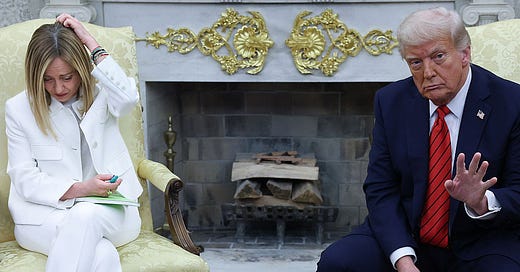‘You have been watching the greatest economic master strategy from an American President in history.’
Stephen Miller, Deputy Chief of Staff for Policy, X, 9 April 2025
Donald Trump, who wishes to be known as an all-round great strategist, made a dramatic announcement on 2 April imposing world-wide tariffs, one of his signature policies. He spent the rest of the month coping with the consequences. It took only a week before the backtracking began, on 9 April. This was in response to a ferocious reaction in the markets that his government was powerless to deflect or contain. The reversal was not however complete and the continuing turmoil threatens to force further retreats, still leaving the American and indeed the whole international, economy in a much weakened state.
We rarely have had such a clear-cut example of bad strategy. This is not about objectives, for someone with terrible intent can be strategically adept, but about deciding on a course of action that will not only fail to achieve its stated intent but will have negative consequences that far exceed the positive. In this respect Trump’s tariffs policy is on the extreme end of the scale of badness, exemplary in its awfulness. It has features that are common to most bad strategies but in key respects it was unique. This was a bad strategic decision that only Donald Trump could have made, not just because he had to be president to make it but also because it was necessary to believe things about international trade that only he and a few close advisers believed.
Yet while an extreme and singular case, Trump’s tariff strategy still requires some examination, both because we will be living with its consequences for some time and because its extremity and singularity throws into relief some issues about all strategies, good and bad.
Most of my work has been in the military sphere where bad strategy invariably involves underestimation of opponents and overestimation of one’s own capabilities. In many cases far too much emphasis is placed on catching the enemy by surprise with bold early moves and not enough on the later moves, especially if the surprise attacks fail to achieve their objectives. Not enough questions are asked about the quality of the intelligence, the sustainability of the logistics, the resilience of the forces, the attitudes of allies. And these problems are aggravated with commanders who are too self-confident and fail to listen to take advice or ask the right questions of their subordinates. Vladimir Putin provides a classic example.
We can read across to Trump’s decision-making. He fits the model of a flawed military commander. He follows a worldview that reflects his prejudices, and he is surrounded by staff prized for their loyalty more than independent judgment. He lacks intellectual curiosity and rejects complicating evidence. His starting assumption is that he has the strength to impose his will.
These flaws are evident in Trump’s strategy in many policy areas, and of course sometimes despite them he can still be successful. The tariffs decision reflected the president’s general approach but involved some distinctive features that raised it to a higher level of badness. In the rest of this post I’ll examine these features, the broader lessons that can be learnt, and the wider consequences of this particular mess.
Keep reading with a 7-day free trial
Subscribe to Comment is Freed to keep reading this post and get 7 days of free access to the full post archives.




